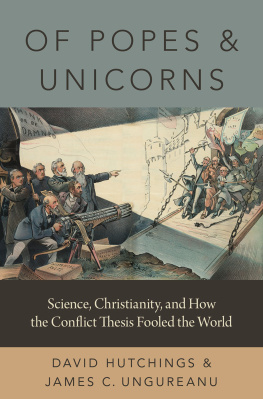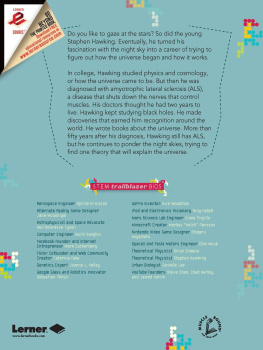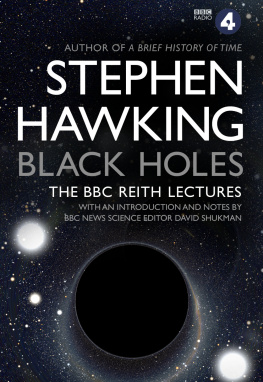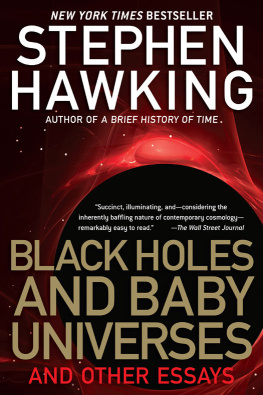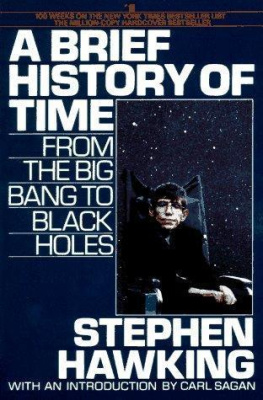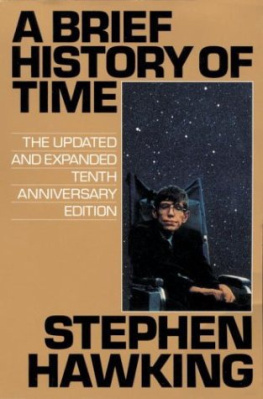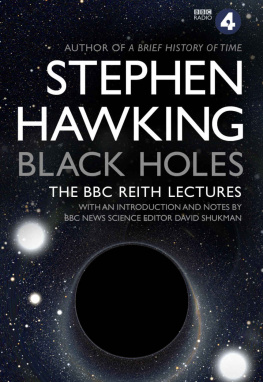David Hutchings - God, Stephen Hawking and the Multiverse
Here you can read online David Hutchings - God, Stephen Hawking and the Multiverse full text of the book (entire story) in english for free. Download pdf and epub, get meaning, cover and reviews about this ebook. year: 2020, publisher: SPCK, genre: Science. Description of the work, (preface) as well as reviews are available. Best literature library LitArk.com created for fans of good reading and offers a wide selection of genres:
Romance novel
Science fiction
Adventure
Detective
Science
History
Home and family
Prose
Art
Politics
Computer
Non-fiction
Religion
Business
Children
Humor
Choose a favorite category and find really read worthwhile books. Enjoy immersion in the world of imagination, feel the emotions of the characters or learn something new for yourself, make an fascinating discovery.

- Book:God, Stephen Hawking and the Multiverse
- Author:
- Publisher:SPCK
- Genre:
- Year:2020
- Rating:5 / 5
- Favourites:Add to favourites
- Your mark:
- 100
- 1
- 2
- 3
- 4
- 5
God, Stephen Hawking and the Multiverse: summary, description and annotation
We offer to read an annotation, description, summary or preface (depends on what the author of the book "God, Stephen Hawking and the Multiverse" wrote himself). If you haven't found the necessary information about the book — write in the comments, we will try to find it.
God, Stephen Hawking and the Multiverse — read online for free the complete book (whole text) full work
Below is the text of the book, divided by pages. System saving the place of the last page read, allows you to conveniently read the book "God, Stephen Hawking and the Multiverse" online for free, without having to search again every time where you left off. Put a bookmark, and you can go to the page where you finished reading at any time.
Font size:
Interval:
Bookmark:

David Hutchings is a physics teacher at Pocklington School near York, England. A Fellow of the Institute of Physics, he has written several books about the relationship between science and religion and speaks regularly on the topic around the country at conferences, schools, universities and churches. David has also run multiple training events for science teachers, specializing in dealing with common misconceptions in the discipline. He lives in York with his wife and two young daughters.
David Wilkinson is Principal of St Johns College and Professor in the Department of Theology and Religion at Durham University. He lives in Newcastle with his wife Alison and has two grown-up children. He is a writer and speaker on Christianity and science not just in the UK but around the world. He has doctorates in astrophysics and theology and is a Fellow of the Royal Astronomical Society. He is also a Methodist minister and the author of many books.
First published in Great Britain in 2020
Society for Promoting Christian Knowledge
36 Causton Street
London SW1P 4ST
www.spck.org.uk
Copyright David Hutchings and David Wilkinson 2020
All rights reserved. No part of this book may be reproduced or transmitted in any form or by any means, electronic or mechanical, including photocopying, recording, or by any information storage and retrieval system, without permission in writing from the publisher.
SPCK does not necessarily endorse the individual views contained in its publications.
Scripture quotation from the Berean Study Bible is copyright 2016 by Bible Hub. Used by permission. All rights reserved worldwide.
Scripture quotation marked esv is from the ESV Bible (The Holy Bible, English Standard Version), copyright 2001 by Crossway, a publishing ministry of Good News Publishers. Used by permission. All rights reserved.
Scripture quotation marked niv is from The Holy Bible, New International Version (Anglicized edition), copyright 1979, 1984, 2011 by Biblica. Used by permission of Hodder & Stoughton Ltd, an Hachette UK company. All rights reserved. niv is a registered trademark of Biblica. UK trademark number 1448790.
British Library Cataloguing - in - Publication Data
A catalogue record for this book is available from the British Library
ISBN 9780281081912
eBook ISBN 9780281081929
1 3 5 7 9 10 8 6 4 2
Typeset by Manila Typesetting Company
First printed in Great Britain by Jellyfish Print Solutions
Subsequently digitally printed in Great Britain
eBook by Manila Typesetting Company
Produced on paper from sustainable forests
David Hutchings
For Bethany:
my Little Girl who asks Big Questions
David Wilkinson
For John Polkinghorne:
teacher and mentor
David Hutchings
When I was still a teenager, somebody (I cant remember who) bought me God, the Big Bang and Stephen Hawking by an astrophysicist-theologian named David Wilkinson. This is important for two reasons: first, it makes it clear how much younger I am than David; second, it shows that the God-and-science conversation is one that I have been interested in for a long time. Having the chance to write about it now and with David, no less is the realization of a dream that I didnt really dare to have in the first place.
The topics of quantum mechanics, general relativity, cosmological origins and the existence of God are Big. So Big, in fact, that no one can realistically attempt to write about them without a huge amount of help. Many experts have been patient and kind enough to contribute to this project, including Luke Barnes, Geoffrey Cantor, William Lane Craig, Reed Guy, Richard Keesing, Tom Lancaster, Tom McLeish, Matt Probert and Aron Wall. All of these folk are deep thinkers who really know their stuff. Their advice has been invaluable.
Special thanks must also go to our guinea-pig readers: Angie Edwards and Martin Steel. They have pored over every word and set us straight many times on how to go about making some pretty inaccessible ideas a little more accessible. Also qualifying for special thanks is my sixth-form student Magnus Swann. He drew all the figures for this book while simultaneously working for his Physics AS Level. My apologies if this has detracted at all from his result. Tony Collins, our publishing powerhouse, deserves thanks for bringing this book into existence by the sheer force of his personality he has kept us focused and on task like a proficient classroom teacher. I am also indebted to Michelle Clark and her seemingly infinite capacity to put up with and then sort out other peoples mistakes.
Finally, to my family Emma, Bethany and Chloe I love you. Thank you for putting up with me working on the book. You are the best. Im not going to say that I couldnt do it (write books) without you, because I could. Its just that I would be miserable and lonely and probably a horrible person.
David Wilkinson
Compared to Davids youthful mind, I am so old that Ive probably forgotten all those who have contributed to the ideas and arguments of this book! But I am grateful to Sir Robert Boyd who, long ago, helped me to see the importance of a Christian doctrine of creation in the light of Hawkings work. In addition to the names above, I am personally thankful for study leave from St Johns College and, as always, the encouragement and understanding of Alison, Adam and Hannah.
Project Shangri - La The icon The book Big Questions Where do we go from here?
The first widely used electronic computers had brains made out of cardboard. Known as punch-cards stiff pieces of paper with holes in specific locations they contained all the instructions the computers needed to complete their super-human tasks.
From the 1950s to the 1970s, businesses craved this new-fangled ability to perform important calculations at whirlwind speed and they were prepared to pay big bucks to the likes of IBM for the privilege of being able to do so.
Big business was not the only computer-consumer; governments saw the advantages too, using computers to track census data and monitor taxes. There can be no doubt about it automated information processing was the new (and ultra-smart) kid on the block.
The world was hurtling forward faster than ever before and thousands of ingenious new programs were being punched into card on almost a daily basis, each promising its own mini-revolution. Despite the staggering number of instruction-sets being produced, one now-infamous stack of cards can still claim to stand out from all the rest. This was the deck that contained the God-Naming Routine or Project Shangri-La , as those involved had dubbed it.
In 1953, Manhattan computer scientist Dr Julien Wagner struck literal gold when he received a highly unusual request from a group of monks from the wilds of Tibet. Incredibly, this isolated band, hidden away in the perilous heights of the Himalayas, already had their own diesel generator and they had also (somehow) become aware of Wagners cutting-edge Automatic Sequence Computer: the Mark V.
In exchange for vast wealth accumulated over centuries (possibly millennia), Wagners team was asked to write a program that would aid the monks in what they considered to be the most sacred of all human quests: determining the true names of God. This was mankinds sole purpose, they believed, and the order had been studying the matter for at least three hundred years.
While it is tempting to imagine that such a campaign would be deeply mystical in nature perhaps names were found through meditation or trance or desperate prayer the monks were instead quite prepared to be pragmatic in their approach. Over the decades, they had systematized the search, steadily working their way through all the possible permutations of letters in their holy alphabet. Their doctrine told them that there were nine billion true names of God and, once they were all found, Gods purpose for the universe would be complete.
Font size:
Interval:
Bookmark:
Similar books «God, Stephen Hawking and the Multiverse»
Look at similar books to God, Stephen Hawking and the Multiverse. We have selected literature similar in name and meaning in the hope of providing readers with more options to find new, interesting, not yet read works.
Discussion, reviews of the book God, Stephen Hawking and the Multiverse and just readers' own opinions. Leave your comments, write what you think about the work, its meaning or the main characters. Specify what exactly you liked and what you didn't like, and why you think so.

